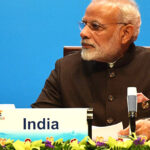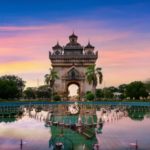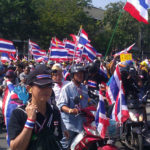
A series of events have unsettled both Thailand’s youth and its ruling class. First, Thai Prime Minister and 2014 coup d’état leader Prayut Chan-o-cha employed an array of authoritarian interventions to ensure his 2019 re-election. Later, the Constitutional Court dissolved the Future Forward Party and banned its young, charismatic leader, Thanathorn Juangroongruangkit. As the COVID-19 pandemic engulfed the globe, Prayut has been accused of using the pandemic to boost his political image, but came under fire for his protracted lockdown, questionable alcohol ban and failure to revive Thailand’s flagging economy. Public criticism of the government—and now the monarchy—have yet to die down.
Protests across the country resumed in July when the Free Youth or Free People movement staged a protest at Democracy Monument to demand the resignation of the Cabinet, the dissolution of the Thai Parliament, and the drafting of a new constitution. Reforms to the Thai monarchy were made public in early August. While this is unchartered territory for Thailand, some of the identifying markers were well within plain sight. Since the death of King Bhumibol Adulyadej in October 2016, King Maha Vajiralongkorn has begun consolidating power in Thailand, assuming control over billions of dollars of Crown Property Bureau assets and the command of two Army units, the 1st and 11th Infantry Regiments.

The bulk of the criticism comes from activists and students, who at a July rally protesters revealed a list of 10 demands inspired by former Thammasat University professor and Thai exile Somsak Jeamteerasakul, who has long been critical of the monarchy, even from his home in Paris. The demands include lowering the budget allocated to the King and the Palace, and ending the junta’s monarchical tributes in Thai education. Shortly after the 2014 coup, the military junta released 12 core Thai values to reinforce loyalty to the monarchy and instill Thai nationalism, reminiscent of former dictator Plaek Phibunsongkhram’s 12 cultural mandates during the Second World War.
Reminders of past student activism have been censored, but not yet erased. The Thai junta, at China’s urging, banned Hong Kong activist Joshua Wong from entering the country to discuss the anniversary of the 1976 Thammasat University massacre, a horrific, yet defining moment in Thai history when students were attacked by royalists and members of right-wing paramilitary organizations with the assistance of police. Just a few years earlier, protests by the National Student Center of Thailand (NSCT) were credited with bringing down the regime of Field Marshal Thanom Kittikachorn, but not before a military crackdown, which is also known as a seminal moment in the life of King Bhumibol, where he ordered the gates of Chitralada Palace opened to students fleeing Thanom’s military crackdown.
Students and activists appear less intimidated by authoritarian repression and the long hiatus of Thailand’s pro-democracy opposition appears to have ended, despite threats by the military-backed Thai government. Once again, student activists are leading calls for reform. Parit “Penguin” Chiwarak, a student at Thammasat University and activist since high school, is one of many leading the reform effort. Appearing in court over her arrest for her appearance at a July protest at Bangkok’s Democracy Monument, Jutatip Sirikhan, president of the Student Union of Thailand and a leader of the Free Youth anti-government group poured white paint over herself in an act of defiance against the Prayuth-led government. Protests have seen as many as 20,000 people gather in Bangkok and 50 of Thailand’s 77 provinces.
Gene Sharp, an American peace scholar and expert on non-violent civil disobedience argued that power resides within individuals rather than rulers, who receive their power from the consent of their subjects. Sources of political power are dependent on the cooperation, acceptance, submission, and obedience of citizens and are vested in various loci, or places where power is located or expressed, such as in social or political organizations, families, or religious groups. Dictators employ a number of means to undermine the loci of citizens. In today’s environment, the state has used repressive tactics such as sedition laws or lèse majesté laws to curb student movements. Parit was later charged with sedition under Section 116 of Thailand’s Criminal Code. Multiple others were also charged, including Anon Nampa, a lawyer who was charged because of his involvement in a Harry Potter-style protest calling for reforms to the monarchy. Among the others detained were two popular Thai rappers, Dechatorn Bamroongmuang of “Rap for Democracy” and Thanayut Na Ayutthaya, or Elevenfinger. A few weeks earlier, the Criminal Court announced arrest warrants for 15 people involved in a July 18 protest at Democracy Monument. The Thai government is also pursuing legal action to force social media companies to remove content regarding student criticisms of the monarchy.
The cost of both violent and nonviolent strategies were evident during the 2014 Orange Revolution in Ukraine. When the state used violence to disrupt civil society protests after a contentious October 2004 presidential election, a majority of Ukrainians perceived the violence to be unwarranted and led to a series of defections by security forces and the eventual transfer of power to Viktor Yushchenko. This could be applicable to Thailand, as research shows that attention paid to security forces can mitigate the impact of violence against non-violent movements. When the cost of repression rises as a result, the regime could resort to alternative strategies, such as negotiation, the promise of new elections, or the disintegration of the regime. This does not occur quickly, and Sharp suggests that activists need to maintain discipline to continue their struggle, aiming to recruit larger sections of civil society or other loci into the movement. The emerging Thai student movement need only look to the past as reference.
Potentially consequential events are ahead. A mass protest in Bangkok is slated for mid-September as is the retirement of Royal Thai Army chief Gen. Apirat Kongsompong, a controversial figure who has in the past told journalists to listen to the ultra-nationalist anthem “Nak Paendin” (Burden of the Land) and who has said that “hating our own country is an incurable disease,” a reference to anti-government protesters. Thai history over the past four decades has demonstrated that the past is prologue to future events. Student revolutions have been silenced by the heavy hand of the state, and revolutions—even non-violent ones—have mixed outcomes. Speculation is rampant. Are events in Thailand just a little bit of history repeating or do they portend major change?






